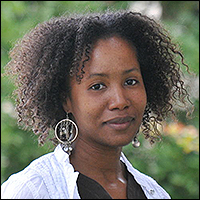Audrey K. Bowden, Dorothy J. Wingfield Phillips Chancellor Faculty Fellow and associate professor of biomedical engineering and electrical engineering, has received a 2022 Lewis Latimer Fellowship. The exclusive program offers only six fellowships per class and fellows are selected through a rigorous nomination process.

The fellowship program is designed to provide special access and mentorship to an exceptional small group of Black innovators for one year. Fellows are supported as they leverage art and technology with social impact and turn their ideas into feasible solutions.
Fellows will attend the 2022 Edison Awards ceremony and summit in April in Ft. Myers, Florida, for four to six days of programming. In October, Latimer fellows will convene for a five-day Silicon Valley Summit. Edison Awards recognize and honor innovation and excellence in the development, marketing and launch of new products and services.
“Audrey is an outstanding researcher and teacher and deserving of such a notable fellowship,” said Philippe Fauchet, Bruce and Bridgitt Evans Dean of Engineering. “Her influence on her students and her dedication to creating technological solutions that address the needs of underserved and disadvantaged communities will have far-reaching impact.”
| Lewis Howard Latimer, 1848–1928, was a Black inventor and patent draftsman who improved Thomas Edison’s original incandescent electric light by patenting the use of a carbon filament that made possible the widespread use of electric light in public and at home. Inventor Thomas Alva Edison, 1847-1931, pioneered five industries that have transformed the world, including the system of electrical power, the phonograph and recorded sound, the telephone transmitter, the storage battery as well as movies and the motion picture camera. |
Bowden’s research is focused on the design and development of biophotonics (light-based) tools for applications to medicine and biology, such as for early detection, diagnosis and therapy for cancer; development and deployment of low-cost, high-performing point-of-care technologies for rural and global health applications.
In 2021, Bowden and a colleague at Stanford University developed a prototype headband that children and teens diagnosed with attention deficit disorders could wear at home. The headband measures brain activity and it could have widespread application in studying and ultimately treating ADHD and other neurological disorders. The team is now optimizing a newer version.
A ‘learn by doing’ curriculum is designed for Latimer fellows. Over 12 months, each fellow will be exposed to corporate business development mentors, unique technologies, artists and communicators. Custom online and live workshops are designed for them.
Bowden is a fellow of The Optical Society, AIMBE, and SPIE, international society for optics and photonics. She is the recipient of a number of awards and honors, including young investigator and teaching awards. Bowden joined the School of Engineering in 2018 from Stanford University.
Bowden received a B.S.E. degree in electrical engineering from Princeton University and a Ph.D. in biomedical engineering from Duke University. She completed postdoctoral training in chemistry and chemical biology at Harvard University.
Contact: Brenda Ellis, 615 343-6314
brenda.ellis@vanderbilt.edu